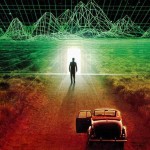 For years leading up to 2012, spiritual-types who were sick of the way the world was heading could take comfort in the promise of a new era that was predicted to begin on December 21 of that year. The Mayans, known for their astronomical expertise had supposedly predicted it. In addition, St. Malachy’s famous Prophecy of the Popes, which predicts when the world as we know it would end, also correlates to about the same time period. The Hopi tribe, Edgar Cayce, a book attributed to Nostradamus, hell, even The History Channel’s countless specials all pointed towards 12/21/12 as the beginning of the end times. The details differed, but whether you believed that Earth was due for a major cataclysm, a spiritual awakening, a religious reckoning and rapture, an alien visitation, a new dimension, or just an enlightened age, most people seemed somewhat excited that a major event was on the horizon. When the day finally arrived, we instead got something that came as a shock to many: absolutely nothing. Or so it would seem.
For years leading up to 2012, spiritual-types who were sick of the way the world was heading could take comfort in the promise of a new era that was predicted to begin on December 21 of that year. The Mayans, known for their astronomical expertise had supposedly predicted it. In addition, St. Malachy’s famous Prophecy of the Popes, which predicts when the world as we know it would end, also correlates to about the same time period. The Hopi tribe, Edgar Cayce, a book attributed to Nostradamus, hell, even The History Channel’s countless specials all pointed towards 12/21/12 as the beginning of the end times. The details differed, but whether you believed that Earth was due for a major cataclysm, a spiritual awakening, a religious reckoning and rapture, an alien visitation, a new dimension, or just an enlightened age, most people seemed somewhat excited that a major event was on the horizon. When the day finally arrived, we instead got something that came as a shock to many: absolutely nothing. Or so it would seem.

I’m very excited about a new app coming out that is completely ahead of its time. It’s called GoogleFuture and it’s amazing. Applying the process of quantum computing, the app enables you to Google search anything, from any time period—including the future. And not just the future of your current timeline, but any possible future. Imagine being able to do a search on yourself to see what becomes of you based on certain choices and decisions—which job brought more success, which partner brought a more lasting relationship, which path brought the most fulfillment. With GoogleFuture there will be no more uncertainty, and really, no need for this article. Truth be told however, there actually are no plans for GoogleFuture, or anything similar, anytime soon as far as I know. But being able to figure out your destiny is really just as easy. Maybe, even easier.
 Back in June 2009, I wrote an article titled “Proof That We’re Living a Life of Illusion.” In it, I provided what I felt was overwhelming evidence that we all live in some kind of computer simulation. I also offered some simple explanations as to why I thought we did. At the time, the people who are open to believing in such fantastical theories excitedly agreed with the premise, while those who rely on hard-core scientific proof, did not. Well, a funny thing’s happened in the years since I wrote that article. Scientists are beginning to see the evidence that the non-believers require. The question now is, whether those skeptics will decide to take the blue pill or the red pill?
Back in June 2009, I wrote an article titled “Proof That We’re Living a Life of Illusion.” In it, I provided what I felt was overwhelming evidence that we all live in some kind of computer simulation. I also offered some simple explanations as to why I thought we did. At the time, the people who are open to believing in such fantastical theories excitedly agreed with the premise, while those who rely on hard-core scientific proof, did not. Well, a funny thing’s happened in the years since I wrote that article. Scientists are beginning to see the evidence that the non-believers require. The question now is, whether those skeptics will decide to take the blue pill or the red pill?
 There is certainly no shortage of theories about what may or may not happen on December 21. Of course, nearly all of them will turn out to be wrong. My experience has shown however, that there is one thing you can do that will likely be beneficial regardless of what’s in store for us: think positive.
There is certainly no shortage of theories about what may or may not happen on December 21. Of course, nearly all of them will turn out to be wrong. My experience has shown however, that there is one thing you can do that will likely be beneficial regardless of what’s in store for us: think positive.
 Let me guess, you don’t have time to read this right now, do you? Yes, the holiday season is always busy and yes time seems to go faster as you get older but doesn’t life seem to be moving at an even more frantic pace than usual lately? I know I’m feeling it. But I’ve been expecting this time crunch for a while now, so it may be a bit easier for me to deal with. Since I tend to be pretty sensitive about this stuff, what I wasn’t sure about was whether others would be able to pick up on it too. In the last few weeks however, I’ve heard at least fifteen different people exclaim in near shock about how fast time’s been going lately. And this without my even bringing it up! So, what’s going on? Can time really be going faster? If so, how much faster can it go before we can no longer keep up? And what then? Are we literally running out of time?
Let me guess, you don’t have time to read this right now, do you? Yes, the holiday season is always busy and yes time seems to go faster as you get older but doesn’t life seem to be moving at an even more frantic pace than usual lately? I know I’m feeling it. But I’ve been expecting this time crunch for a while now, so it may be a bit easier for me to deal with. Since I tend to be pretty sensitive about this stuff, what I wasn’t sure about was whether others would be able to pick up on it too. In the last few weeks however, I’ve heard at least fifteen different people exclaim in near shock about how fast time’s been going lately. And this without my even bringing it up! So, what’s going on? Can time really be going faster? If so, how much faster can it go before we can no longer keep up? And what then? Are we literally running out of time?
 Have you been feeling a bit dizzy lately? Does time feel like it’s been flying by faster than ever? Experiencing ringing in your ears? Seeing flashes of light or fleeting glimpses of things that aren’t there? If you’re not head-over heels in love, pregnant, or smokin’ da ganja, you may be going through what’s known as ascension symptoms. What are they, why are they happening, what do they mean, and will they ever go away? If you’d like answers to questions like these, the latest installment of Layman just might be the prescription you’ve been looking for.
Have you been feeling a bit dizzy lately? Does time feel like it’s been flying by faster than ever? Experiencing ringing in your ears? Seeing flashes of light or fleeting glimpses of things that aren’t there? If you’re not head-over heels in love, pregnant, or smokin’ da ganja, you may be going through what’s known as ascension symptoms. What are they, why are they happening, what do they mean, and will they ever go away? If you’d like answers to questions like these, the latest installment of Layman just might be the prescription you’ve been looking for.
 If you’ve ever wondered why we are here, this article is for you. If you’ve never wondered, some part of you has been wondering without your knowledge or else you wouldn’t be reading this now. There’s been a lot written about what life is and what we’re doing here. Some of it is very technical and philosophical. Some of it is very metaphorical and poetic. And then there is the actual answer, which we may never know. However, one truth I’ve noticed about this world is that cycles exist within cycles within cycles. Electrons swirling around a neutron are similar to our planets swirling around the sun. The shape of a leaf is indicative of the shape of the tree it came from. History repeats itself. Myths evolve over time but their basic elements all remain the same. Putting these truths together I was able to trace back to the origins of the first story and, to my shock and awe, uncovered an answer to a question I’ve been wondering for a very long time: why did the universe evolve to become so seemingly complicated? The answer, ironically enough, is incredibly simple.
If you’ve ever wondered why we are here, this article is for you. If you’ve never wondered, some part of you has been wondering without your knowledge or else you wouldn’t be reading this now. There’s been a lot written about what life is and what we’re doing here. Some of it is very technical and philosophical. Some of it is very metaphorical and poetic. And then there is the actual answer, which we may never know. However, one truth I’ve noticed about this world is that cycles exist within cycles within cycles. Electrons swirling around a neutron are similar to our planets swirling around the sun. The shape of a leaf is indicative of the shape of the tree it came from. History repeats itself. Myths evolve over time but their basic elements all remain the same. Putting these truths together I was able to trace back to the origins of the first story and, to my shock and awe, uncovered an answer to a question I’ve been wondering for a very long time: why did the universe evolve to become so seemingly complicated? The answer, ironically enough, is incredibly simple.
 Lost is dead. Long live Lost. And so it ends, in much the same way it began—with a close-up of Jack’s eye, staring straight up past the tall stalks of bamboo that circled the sky above. This time however, that eye would close, and with it, our six-season journey that took us right back to where we started—with questions about a mysterious show that seemed to parallel the mysteries of life. For some, the journey was far more compelling than the destination. For others, it was the perfect resolution and they can walk away feeling fulfilled. Whatever you thought about the conclusion, the one thing most viewers can agree on is that the show challenged us to think in ways we might not have otherwise. In short, Lost was a real trip. And what a long, strange trip it’s been.
Lost is dead. Long live Lost. And so it ends, in much the same way it began—with a close-up of Jack’s eye, staring straight up past the tall stalks of bamboo that circled the sky above. This time however, that eye would close, and with it, our six-season journey that took us right back to where we started—with questions about a mysterious show that seemed to parallel the mysteries of life. For some, the journey was far more compelling than the destination. For others, it was the perfect resolution and they can walk away feeling fulfilled. Whatever you thought about the conclusion, the one thing most viewers can agree on is that the show challenged us to think in ways we might not have otherwise. In short, Lost was a real trip. And what a long, strange trip it’s been.
 In the penultimate episode of Lost, “What They Died For,” Jacob tells the surviving Losties why he chose them as candidates: “I chose you because you were all alone. You were all looking for something that you couldn’t find out there. I chose you because you needed this place as much as it needed you.” This explanation really resonated with me, on one hand because it provided a mythologically sound answer to the main question I’ve always had about Lost: why do all these characters have major issues? And having that answer provided the other reason I really liked the explanation: I immediately understood that while Jacob was addressing the remaining candidates, he was really speaking to us.
In the penultimate episode of Lost, “What They Died For,” Jacob tells the surviving Losties why he chose them as candidates: “I chose you because you were all alone. You were all looking for something that you couldn’t find out there. I chose you because you needed this place as much as it needed you.” This explanation really resonated with me, on one hand because it provided a mythologically sound answer to the main question I’ve always had about Lost: why do all these characters have major issues? And having that answer provided the other reason I really liked the explanation: I immediately understood that while Jacob was addressing the remaining candidates, he was really speaking to us.
 In “Across the Sea,” Lost finally gives us the origins story for Jacob and the Man In Black. The episode was pure, 100% mythology. Those who watched the episode based on the surface story alone were probably disappointed. Let’s face it, taken literally, myths are silly: talking snakes, little boys defeating giants, jealous gods, immaculate conceptions, mortals with superpowers, a sword stuck in a stone, the Force, Never Never Land, Wonderland, Oz, the Matrix, the Island. On the surface, all myths seem like children’s stories. It’s only when we dig deeper that we find the truth worthy of a wise old soul—a soul that knows where it really came from.
In “Across the Sea,” Lost finally gives us the origins story for Jacob and the Man In Black. The episode was pure, 100% mythology. Those who watched the episode based on the surface story alone were probably disappointed. Let’s face it, taken literally, myths are silly: talking snakes, little boys defeating giants, jealous gods, immaculate conceptions, mortals with superpowers, a sword stuck in a stone, the Force, Never Never Land, Wonderland, Oz, the Matrix, the Island. On the surface, all myths seem like children’s stories. It’s only when we dig deeper that we find the truth worthy of a wise old soul—a soul that knows where it really came from.
 For years leading up to 2012, spiritual-types who were sick of the way the world was heading could take comfort in the promise of a new era that was predicted to begin on December 21 of that year. The Mayans, known for their astronomical expertise had supposedly predicted it. In addition, St. Malachy’s famous Prophecy of the Popes, which predicts when the world as we know it would end, also correlates to about the same time period. The Hopi tribe, Edgar Cayce, a book attributed to Nostradamus, hell, even The History Channel’s countless specials all pointed towards 12/21/12 as the beginning of the end times. The details differed, but whether you believed that Earth was due for a major cataclysm, a spiritual awakening, a religious reckoning and rapture, an alien visitation, a new dimension, or just an enlightened age, most people seemed somewhat excited that a major event was on the horizon. When the day finally arrived, we instead got something that came as a shock to many: absolutely nothing. Or so it would seem.
For years leading up to 2012, spiritual-types who were sick of the way the world was heading could take comfort in the promise of a new era that was predicted to begin on December 21 of that year. The Mayans, known for their astronomical expertise had supposedly predicted it. In addition, St. Malachy’s famous Prophecy of the Popes, which predicts when the world as we know it would end, also correlates to about the same time period. The Hopi tribe, Edgar Cayce, a book attributed to Nostradamus, hell, even The History Channel’s countless specials all pointed towards 12/21/12 as the beginning of the end times. The details differed, but whether you believed that Earth was due for a major cataclysm, a spiritual awakening, a religious reckoning and rapture, an alien visitation, a new dimension, or just an enlightened age, most people seemed somewhat excited that a major event was on the horizon. When the day finally arrived, we instead got something that came as a shock to many: absolutely nothing. Or so it would seem.









